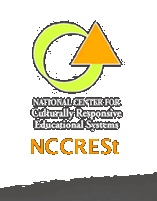
---
---
---
---
---

 |
 |
NCCREStpart of the Education Reform NetworksWaging Peace in Our SchoolsThe Resolving Conflicts Creatively Program (RCCP) described in this book asserts that schools must educate the child's heart as well as the mind. RCCP began in 1985 as a joint initiative of Educators for Social Responsibility Metropolitan Area and the New York City Board of Education. The program started in 3 schools in New York City and has expanded to more than 325 schools nationwide, serving over 150,000 students. RCCP focuses on three dimensions of creating safe and caring schools: (1) conflict resolution; (2) valuing diversity; and (3) enhancing social and emotional learning. Chapter 1 describes a vision of learning that promotes emotional literacy, conflict resolution, and diversity education. Chapter 2 describes the "peaceable" classroom in which this vision is enacted. In Chapter 3, "How To Wage Peace: The Skills of Conflict Resolution," and Chapter 4, "Valuing Diversity: Creating Inclusive Schools and Communities," the specific concepts and skills the program teaches students and adults are described. Chapter 5 focuses on the role of the teacher in creating a safe and caring learning environment. Chapter 6 describes the work of mediation in the schools, and Chapter 7, "Signs of Hope," presents the reactions of young people who have served as mediators. In Chapter 8, the parent component of RCCP is described. Chapter 9 describes the beginnings of the RCCP and its model. In Chapter 10, the peaceable school is described. Chapter 11 considers the importance of community involvement and the steps necessary to sustain the peaceable classroom and school. (SLD) This resource is cataloged under:
More like this one
|
|
 Funded by the
Funded by the